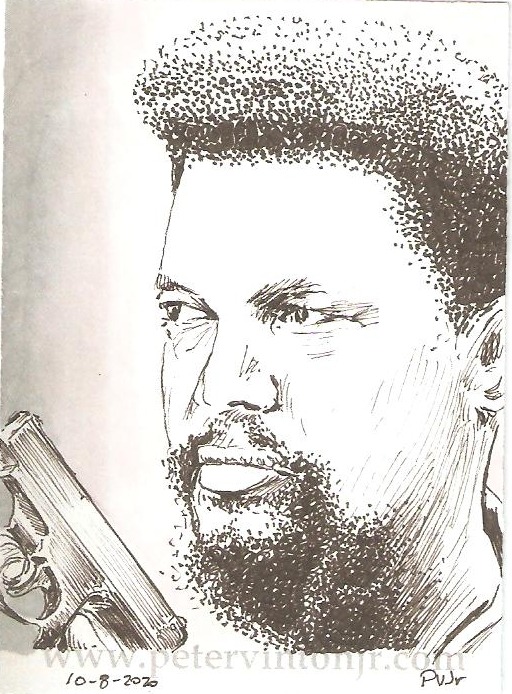
An ongoing illustrative history study
This piece originally posted 12/28/2020
Prelude | 58 | 59 | 60 | 61 | 62 | 63 | 64 | 65 | MLK | Email |
|---|
"The Afro-American militant is a 'militant' because he defends himself, his family, his home, and his dignity. He does not introduce violence into a racist social system --the violence is already there, and has always been there. It is precisely this unchallenged violence that allows a racist social system to perpetuate itself."
Right or wrong, Robert Franklin Williams has been popularly depicted as the very stereotype of the Black Man that "white suburbia" most fears --stoic, defiant, and armed. Rather than flee from this imagery, Williams instead opted to embrace it; his advocacy of informed individual self-defense anticipated later nationalistic "Black Power" movements like the OAAU and the Black Panther Party.
Born in 1925 North Carolina, Williams later moved to Detroit where he worked for an auto company and became an organizer for the United Auto Workers (UAW) union, and was also present during the Detroit race riot of June 20, 1943. He also served in the USMC during WWII, then after the war returned to his hometown in North Carolina. He became president of the local branch of the NAACP and began advocating for a more militant approach to segregation, which flew in the face of the more conventional wisdom. A pivotal moment came in 1957 when a local public swimming pool attempted to desegregate and was promptly met with armed resistance from the local chapter of the Ku Klux Klan. Williams publicly vowed to "meet violence with violence" and openly called for Black citizens to stockpile weapons of their own. As a consequence the NAACP suspended him from his leadership position and Williams began publishing his own newsletter, The Crusader.
During the 1961 Freedom Rides, Williams organized self-defense groups to protect the riders, but resultant mob violence and police standoffs ultimately led to Williams's indictment on (fabricated) kidnapping charges --during the violence he and his then-wife had permitted a white couple to take refuge in their home. Ultimately Williams fled to Cuba, where he lived in exile for the next eight years though still continued to publish The Crusader and even broadcast a program, "Radio Free Dixie," aimed at Black Americans in the South. Williams also traveled to Tanzania and even China during this time, speaking out against colonialism and racism, and also opposing the war in Vietnam. He also published a groundbreaking book, "Negroes With Guns," which, while inflammatory to many whites, did lay out a thoughtful, reasoned approach to self-defense and was a key inspiration for Huey P. Newton, founder of the Black Panther Party (BPP).
While the kidnapping charges against Williams were never formally dropped until 1976, he eventually did return to the U.S. and in later years tempered his aggressive message and distanced himself from nationalists like Newton. Williams died of cancer in 1996.
Next page - Lesson 63: Sammy Younge, Jr.